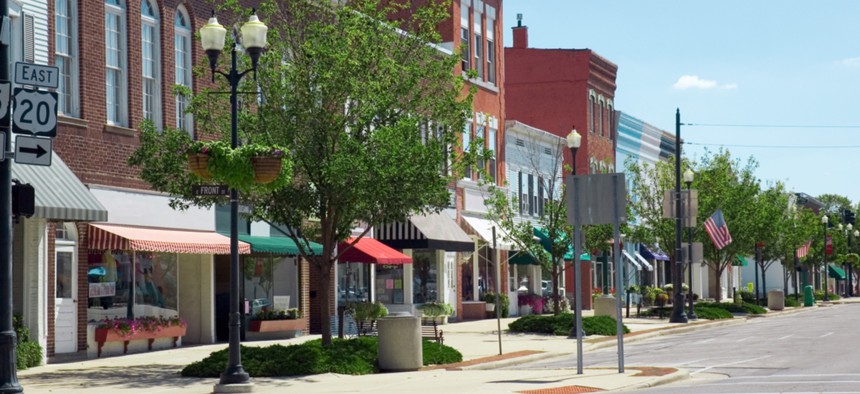Saving Main Street: Why State and Local Governments Are Vital for Its Survival

Small businesses have experienced significant hardships during the Covid-19 pandemic. SHUTTERSTOCK/Michael Shake
COMMENTARY | Main Street America is facing its toughest crisis ever as people stay at home to slow the spread of coronavirus. State and local governments need to step up to help businesses stay alive.
The storefront signs read, “Closed.” Nobody is walking by on the sidewalks. And profits have plummeted or are nonexistent. This is the new norm for Main Street businesses in the era of Covid-19. Since the first stay-at-home orders went into effect, independent small businesses have borne the brunt of the economic hardship brought on by the pandemic.
The nearly 31 million small businesses in the United States are the backbone of the U.S. economy. They make up approximately 44% of economic activity, create almost two-thirds of new jobs and employ almost half of the U.S. workforce, according to the Small Business Administration.
Before Covid-19, small businesses in many places were experiencing a resurgence after decades of economic shifts like globalization, the rise of dominant online marketplaces and the 2008 recession reduced their economic contributions. For example, more women and people of color were starting their own businesses. And new state and local investments were being made in downtown revitalization projects, business improvement districts and resources for new entrepreneurs.
Now, small businesses face an extraordinarily dismal economic outlook that threaten their survival. Kennedy Smith, a senior researcher for the Institute for Local Self-Reliance (ILSR) described the current situation as “an existential crisis” for Main Streets.
A recent survey from the National Main Street Center found that 3.5 million small businesses are in danger of closing within two months. If disruptions persist, 7.5 million businesses may permanently shutter within five months. Amanda Ballantyne, executive director for the Main Street Alliance, predicted during a Bloomberg Businessweek town hall that a wave of small business bankruptcies is on the horizon that will parallel unemployment numbers.
This would mirror our experiences with natural disasters, which are notoriously hard on small businesses. The Federal Emergency Management Agency estimates that 40-60% of small businesses don’t reopen after a disaster.
The significant hurdle for most small businesses is a lack of cash reserves. Although it varies by industry, ILSR estimates that the average small business has only enough money in reserve to stay afloat for 27 days. The Payroll Protection Program (PPP), established under the CARES Act was meant to provide loans to help businesses weather the crisis. But demand, unsurprisingly, outpaced supply, prompting the need for additional federal funding. Yet, even with an additional $310 billion recently funneled into the PPP, Sarah Crozier, a spokesperson for the Main Street Alliance, told Route Fifty that the available support will remain insufficient. Program design flaws that enabled larger companies to access capital more quickly than mom-and-pop stores, combined with the ambiguity of the loan’s forgiveness terms, has fueled frustration and skepticism among the small business community, Crozier said. Additionally, she said the PPP’s loan restrictions make some small business owners hesitant to take on substantial debt when it may not guarantee their survival.
Although mass small business closures would devastate state and local government budgets, already facing major shortfalls, snapping back to “business as usual” is unrealistic. Even as some states begin to relax stay-at-home orders, decreased consumer spending power amid rising unemployment and low consumer confidence almost guarantees continued financial hardship until a vaccine or anti-viral medication prove effective.
If small businesses are going to survive, cash alone won’t be enough. Intensive, long-term assistance will be necessary to help businesses recover. That’s where state and local governments come in.
Many state and local governments took immediate action to help small businesses in the early days of the pandemic. States like Washington and Oregon, as well as many localities, swept in to help businesses by offering financial assistance, placing moratoriums on evictions and utility shut offs and enhancing eligibility for social safety net programs. Those early, swift measures will likely pay off, as Crozier said businesses in those jurisdictions seem better positioned to weather the current crisis.
State and local governments must continue providing proactive assistance to small businesses and should start shifting their focus to the long-term needs of small businesses, said Patrice Frey, President and CEO of the National Main Street Center. That means finding ways to support local economic development organizations like chambers of commerce, community foundations and Main Street programs that help revitalize downtowns and commercial districts.
Frey said that these organizations are instrumental in connecting small businesses to programs that offer financial aid and services that advocate for payment deferrals or waivers. Additionally, the groups offer a return on investment to the local economy. For example, in Washington State, Frey said that “for every $1 it invests in a Main Street program, there is a $13 return to the public coffer” in the form of taxes and fees.
Additionally, state and local governments can level the playing field for small businesses and prevent unfair competition. Smith with ILSR said that stay-at-home orders unintentionally created a loophole that allowed large chains that offer essential retail services like food, beverages and pharmacy products to continue in-store operations for non-essential goods like toys and electronics. In comparison, small businesses selling similar products were forced to close their physical spaces, creating an unfair advantage. Places like Michigan, Vermont and some localities addressed this issue, but Smith pointed to it as an example of how state and local governments can leverage their positions to fix new and legacy issues exposed by the crisis related to the supply chain, access to capital for people of color and women and social program eligibility requirements.
Main Street isn’t just an economic driver. It is a hallmark of American culture. The losses felt by mom-and-pop shops will not only weaken local economies but have the potential to damage the social fabric of the communities they reside in. As Crozier said, “This is beyond just an economic tragedy. This is beyond a public health tragedy. This is a cultural tragedy.”
State and local governments have a vested economic and social interest to keep Main Street up and running. They must act as its strongest ally and protect it from irreversible economic ruin.
OTHER STORIES on Route Fifty:
Alisha Powell Gillis is the senior editor for Route Fifty.
NEXT STORY: A Budget Shortfall Estimate for States Grows Even Worse






